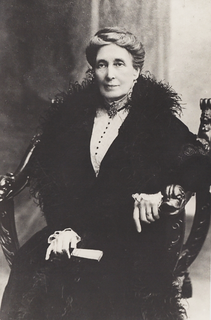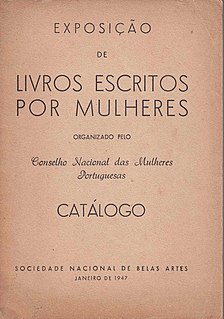John of Portugal, occasionally surnamed Castro, was the eldest surviving son of King Peter I of Portugal by his mistress Inês de Castro. He was a potential but unsuccessful contender for the Portuguese throne during the 1383–85 crisis of succession.
Hugo José Jorge O'Neill was the head of the Clanaboy O'Neill dynasty, whose family has been in Portugal since the 18th century.

Maria Manuela Dias Ferreira LeiteGCC GCIH, commonly known as Manuela Ferreira Leite, is a Portuguese economist, pundit and retired politician.

Lucrécia Augusta de Brito de Berredo Furtado de Melo Arriaga was the wife of Manuel de Arriaga, the first President of the Portuguese Republic and was, thus, the first First Lady of Portugal from 1911 to 1915, when her husband resigned from the post.

Joaquim Pereira Teixeira de Vasconcelos, better known by his pen name Teixeira de Pascoaes, was a Portuguese poet. He was nominated five times for the Nobel Prize in Literature.

Virgínia Sofia Guerra Quaresma was the first woman to take up professional journalism in Portugal and was one of the first women graduates from the Faculty of Arts of the University of Lisbon. She was openly lesbian, in a time when society dictated that sexual orientation be hidden, and a feminist, who advocated for full equality between men and women. In her coverage of a sensational murder case in Brazil, she brought the issue of violence against women to the forefront. In the 1930s, she relocated permanently to Brazil, but traveled internationally with her work. A street was renamed in her honor in the Belém neighborhood of Lisbon, and in 2010, she was honored with a stamp bearing her likeness, along with other women.

The Portuguese Women's Crusade was a Portuguese feminist beneficence movement, founded in 1916 by a group of women led by First Lady Elzira Dantas Machado, aiming to provide moral and material assistance to those in need in the context of the First World War and the enforcement of conscription. It disbanded in 1938. A staple of the so-called first-wave feminism in Portugal, it has been studied as a key feature of the history of feminism in the context of the Portuguese First Republic.

The Conselho Nacional das Mulheres Portuguesas was a feminist organization founded in 1914.
Ruth Garcês (1934–2006) was a Portuguese lawyer, magistrate and judge. She was the first female magistrate and the first female judge in Portugal. She founded the Portuguese Association of Women Judges.

Domitila de Carvalho (1871–1966) was a Portuguese doctor, teacher, writer and politician. She was the first woman to attend the University of Coimbra in Portugal, from where she graduated in Mathematics, Philosophy and Medicine. A supporter of the authoritarian Estado Novo government, she was also one of the first three female deputies elected in Portugal.

Maria Guardiola (1895-1987) was a Portuguese schoolteacher. A supporter of the right-wing Estado Novo, she was an anti-feminist in charge of the regime's Mocidade Portuguesa Feminina for more than three decades and was one of the first three women in the country’s National Assembly (parliament), being elected in 1934.

Isabel de Magalhães Colaço was a Portuguese lawyer and university professor who was the first woman to obtain a doctorate of law in Portugal and the first woman to sit on the country’s Constitutional Court.

Aurora Teixeira de Castro was vice-president in 1926 and 1927 of the feminist Conselho Nacional das Mulheres Portuguesas. She was a lawyer and notary and the first female notary in Portugal.
Maria Alzira Lemos, also known as Maria Alzira Costa de Castro Cardoso Lemos (1919–2005), was a Portuguese parliamentary deputy, socialist, feminist and women's rights activist, who assisted with the creation of the Portuguese Platform for the Rights of Women.
Regina Tavares da Silva is a Portuguese politician, feminist, historical researcher and an international expert on women's rights. She has chaired several women's organizations, both Portuguese and international. She is arguably best known for her insistence that women's equality should not be treated as a social issue but as a requirement of both democracy and human rights.

Emília de Sousa Costa was a teacher who promoted female education, a writer of novels for both adults and children and a feminist. She is considered a pioneer of children's literature in the Portuguese language and also translated several stories by the Brothers Grimm into Portuguese.

Eduarda Lapa was a painter and painting teacher who specialized in naturalist painting, especially still life, becoming known as the "flower painter" and the "ambassador of colours". An active feminist, she was the first woman to join the board of the Portuguese National Society of Fine Arts.

Isabel Gago was only the second woman to study engineering in Portugal and the first woman to teach chemical engineering.
Joana Marques Vidal is a Portuguese lawyer who served as the Attorney General of Portugal between 2012 and 2018, the first woman to hold the post.
António Pereira Cândido de Figueiredo, usually referred to as Cândido de Figueiredo was a Portuguese lawyer and civil servant by trade who later became well-known as a writer, lexicographer, grammarian, and philologist specializing in the Portuguese language.













